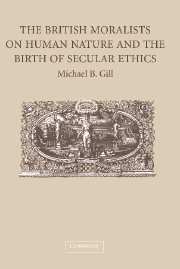Book contents
- Frontmatter
- Contents
- Introduction
- PART ONE WHICHCOTE AND CUDWORTH
- 1 The Negative Answer of English Calvinism
- 2 Whichcote and Cudworth's Positive Answer
- 3 Whichcote and Cudworth on Religious Liberty
- 4 Rationalism, Sentimentalism, and Ralph Cudworth
- 5 The Emergence of Non-Christian Ethics
- PART TWO SHAFTESBURY
- PART THREE HUTCHESON
- PART FOUR DAVID HUME
- Notes
- Bibliography
- Index
3 - Whichcote and Cudworth on Religious Liberty
Published online by Cambridge University Press: 29 July 2009
- Frontmatter
- Contents
- Introduction
- PART ONE WHICHCOTE AND CUDWORTH
- 1 The Negative Answer of English Calvinism
- 2 Whichcote and Cudworth's Positive Answer
- 3 Whichcote and Cudworth on Religious Liberty
- 4 Rationalism, Sentimentalism, and Ralph Cudworth
- 5 The Emergence of Non-Christian Ethics
- PART TWO SHAFTESBURY
- PART THREE HUTCHESON
- PART FOUR DAVID HUME
- Notes
- Bibliography
- Index
Summary
In the preceding chapter, I cast the thought of Whichcote and Cudworth as a reaction against the Calvinism of their families and fellow students and tutors at Emmanuel. But the goal of this chapter is to explain Whichcote and Cudworth's crucial role in the development of religious liberty. And to do this, we need to situate them in a broader context, amid the political and religious upheavals of mid-seventeenth-century England as a whole. In Section A, I fill in some of this background. In B, I sketch the main points of Whichcote and Cudworth's views on religious liberty and how Whichcote embodied those views during the civil war in the 1650s. And in C, I look at arguments for religious liberty Cudworth gave in 1647.
Religion and State in Mid-Seventeenth-Century England
In the 1630s and early 1640s, there were numerous disputes between the king and Parliament that erupted into civil war in 1642. The English Calvinists were squarely on the Parliamentary side of this conflict, and Whichcote and Cudworth were generally associated with the Parliamentary cause as well. Part of the reason for this association was social. Whichcote and Cudworth came from Calvinist families and they attended a Calvinist college. And while they were certainly opposed to the Calvinists' religious doctrines, there is no indication of personal hostility between them and their families and colleagues. The evidence suggests, rather, that Whichcote and Cudworth remained very close to the people with whom they grew up and studied.
- Type
- Chapter
- Information
- Publisher: Cambridge University PressPrint publication year: 2006



